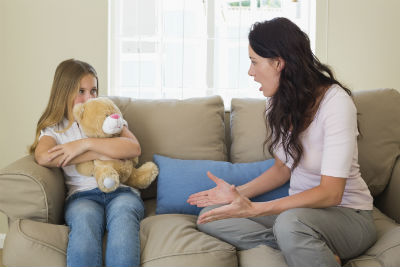Why Do Parents Yell at Their Kids?
There are lots of reasons parents yell: they may be stressed, overwhelmed, scared or overtired. Their children may be misbehaving, disrespectful, mistreating others, engaging in truant or illegal behavior, failing school or not doing their chores. Parents may yell because that is how they were disciplined when they were young. Maybe they yell because they feel it’s effective or maybe they yell because they simply don’t know what else to do.
Let’s consider a typical example. Lauren, a loving mother of sixteen year old Madison and four year old Tyler would never intentionally hurt her children. Each day Lauren wakes up promising herself that today will be the day that she won’t loose her cool with her kids. Today, she makes it all the way to bed time. Exhausted from the days activities, Lauren has to get her kids in bed and then continue working on a project she wasn’t able to complete at work that day. The following conversation ensues:
Lauren: “Tyler, you need to go back to bed and stay there.”
Tyler: “But I need my special zebra.”
Lauren: “We’ll have to look for it tomorrow. It’s late now. Please go back to bed.”
Tyler: “No! Find my zebra. Where is it? I’m not moving.”
Lauren (now angry): “Why do always need to do this Tyler? Get back in bed! Now!”
Tyler (crying): “No!”
Lauren: “What’s wrong with you!!”
Madison: “Mom, where’s my phone?”
Lauren: “Leave me alone! I’m busy and you never give me my space!”
After another ten minute struggle, Tyler finally gets back in bed crying and Lauren returns to her work feeling guilty having no further contact with her daughter for the night.
How could Lauren have ended this day on a calmer note? Before we talk about how to stop yelling, we must first clarify why yelling is a bad idea.
Why Stop Yelling?
1. Children are typically black-and-white thinkers. They don’t yet have the cognitive abilities to distinguish between ‘I’ve done a bad thing’, and ‘I’m a bad person’. So a child who is the recipient of constant yelling eventually internalizes the message that they are bad person, deserving of being ridiculed often. This, in turn negatively effects a child’s self esteem which may eventually cause them to sabotage their successes and/or surround themselves with friends and partners who yell at them or berate them in other ways.
2. Yelling at your children teaches them that yelling is an acceptable form of communication. Your child thinks, “If mom and dad are doing it, that must be the way to do it.” It won’t take very long before they begin yelling right back at you or others. Each time you yell is a missed opportunity to model other ways of communicating more positively and effectively.
3. Yelling conditions your children to misbehave again. Your child may listen to you in the moment they are being yelled at, but in the long run they are being taught that misbehaving is a great way to get an immediate and intense reaction out of you. True, it may be negative attention, but it’s still attention, something all children crave. The more reactive you are when your child misbehaves, the more likely they are to repeat the bad behavior. Think about it: What’s more likely to elicit an enthusiastic reaction from you? When your child brings home a good test grade, or when he teases his sister – again?
How to Stop Yelling
 1. Get used to checking your own internal emotional state. If you are feeling angry, irritated or out of control yourself, now is definitely and specifically not the time for a teachable moment. The irony of this is that at the very moments you feel most compelled to act, are the same moments in which it becomes imperative that you wait before doing so. Never attempt to discipline your children when you are feeling angry. Instead, seek a quiet moment for yourself; a grown-up time out of sorts. Keep in mind that very few situations are dire enough that warrant your immediate action. Take the time to get in touch with how you are feeling and what’s bothering you. Be kind to yourself and speak to yourself in an emphatic, calming and forgiving way. Begin to do this with yourself because ultimately, this is how you want to be responding to your children. But it starts with you. Once you have calmed down and sorted yourself out, you can reapproach the situation at hand from your calmer vantage point.
1. Get used to checking your own internal emotional state. If you are feeling angry, irritated or out of control yourself, now is definitely and specifically not the time for a teachable moment. The irony of this is that at the very moments you feel most compelled to act, are the same moments in which it becomes imperative that you wait before doing so. Never attempt to discipline your children when you are feeling angry. Instead, seek a quiet moment for yourself; a grown-up time out of sorts. Keep in mind that very few situations are dire enough that warrant your immediate action. Take the time to get in touch with how you are feeling and what’s bothering you. Be kind to yourself and speak to yourself in an emphatic, calming and forgiving way. Begin to do this with yourself because ultimately, this is how you want to be responding to your children. But it starts with you. Once you have calmed down and sorted yourself out, you can reapproach the situation at hand from your calmer vantage point.
2. Prioritize. In any given situation it’s important to evaluate your priorities. In our example with Lauren, at a certain point her top priority switched from being “I won’t yell today” to “I need to get this work done right now.” If someone promised you $1.00 to motivate you not to yell at all on Monday, would you end up yelling? What if they offered you $1,000.00? or $10,000.00? How important is it to you to stop yelling? Commit to making calm discipline your top priority no matter what. Picture that you are being given a huge monetary incentive or better yet, give yourself a real incentive. Commit to not yelling for an amount of time you specify. When you reach your goal, reward yourself. Teachers do it, bosses do it, parents do it, you can do it too.
3. Have your family hold you accountable. Let your children know that you are working on not yelling at them anymore. Have a discussion with them where you let them know that you are working on yourself because you want to be a more effective parent and role-model. Invite them to remind you not to yell if you slip up and reassure them that they won’t be in trouble for doing so. Let your children know that the reminder will help you change your tune and discipline more appropriately. Very often, yelling is taboo topic. Children often experience high levels of embarrassment and shame; they privately lick their wounds and suffer silently. Bringing the issue to the fore, talking about it, and breaking the silence and the secrecy can be a healing experience for the whole family.
4. Parent as though someone is always watching. Pretend you are staring in a reality TV show. Or picture your boss, neighbor, or someone who’s opinion you care about following you around as you interact with your children.
5. Empathize. Why is your child misbehaving in the first place? Try to isolate the underlying cause of thier lousy conduct. Children often display out of control behavior when they feel invalidated and/or misunderstood. Help your child name her emotions (e.g. – you are feeling angry, sad, embarrassed, etc.) Repeat back to your child what you are hearing them say and let them know that they are entitled to their feelings. Validate their experiences, even if you don’t agree with them. (e.g. “It sounds like you feel like Mrs. Douglas is really mistreating you.) Offer help and a solution when applicable. Consistently empathizing with your children when they misbehave can help them bypass their anger and become more in touch with hurt and pain instead. So instead of yelling or acting out, your child will hopefully learn to talk instead.
6. Modify your expectations. Assume that things will take longer than you’d like. Assume that your child’s room will still be messier than the picture in your mind, even after he cleans it. Expect that your teen will continue to disrespect you, even as you do everything you can to change her behavior. Lowering your expectations and modifying your assumptions will help you maintain more flexibility and be more open-minded as you work to implement changes in your children. Flexibility and open-mindedness allows for more possibilities, so your thinking is less rigid and more relaxed as a result.
7. Depersonalize. Many times, parents take their children’s bad conduct personally. While you may feel that your child’s disrespect is directed at you and they misbehave just to slight you, remember that it’s not about you. You, as the parent are simply an easy and accessible target. Your child’s behavior is about him, (his anger, his maturity level, his own frustrations) just like your behavior is about you. One way you may be able to implement denationalization is by using what I call the “the kindergarten teacher affect”. Picture a competent kindergarten teacher. No matter what is going on, she deals with it in a level-headed yet somewhat detached way. If a kid is disrespectful, she’ll speak to them about proper conduct. If a kid spills his milk, she’ll have him get a paper towel to mop it up. She is not emotionally involved and so her responses are not emotionally charged. Before disciplining your children, emotionally remove yourself from the situation by seeing your child not as your own, but as a babysitting charge, niece or a friend’s child.
8. Don’t react to reactivity. Many times, when a toddler begins to tantrum, a child begins to scream, or a teen begins to yell, parents match their child’s level of reactivity. If a child is out of control, the parent can automatically join suit, matching the behavior. If this describes you, be aware of it and maintain proper emotional boundaries. Just because your child is out of control, doesn’t mean you need to be. In fact, when your child is out of control, it is that much more important for you to remain calm and level headed so that you can help bring your child out of it, instead of getting sucked in to their unbalanced emotional state. Tell your child that you see they are hurting and/or in pain. Tell them you would like to sit down and talk to them once they have regained their composure. Do not engage your child while they are yelling to you or at you. See if they will allow you to help calm them. If not, let them know you are leaving until they can get themselves together, at which time you will be happy to speak to them.
8. Damage control. If you do yell, exercise damage control by discussing the incident openly. Invite your children to share how being yelled at makes them feel. Apologize for yelling and stress that you didn’t handle things appropriately and you wish you had been calmer and more in control. When appropriate, ask your children how they may have handled the situation if they were the parent.
Conclusion
We would all like to communicate better with our loved ones. We can all do better, and we owe it to our children and ourselves to do so. If you feel you need more guidance, you may want to seek out the help of a competent relationship therapist.
